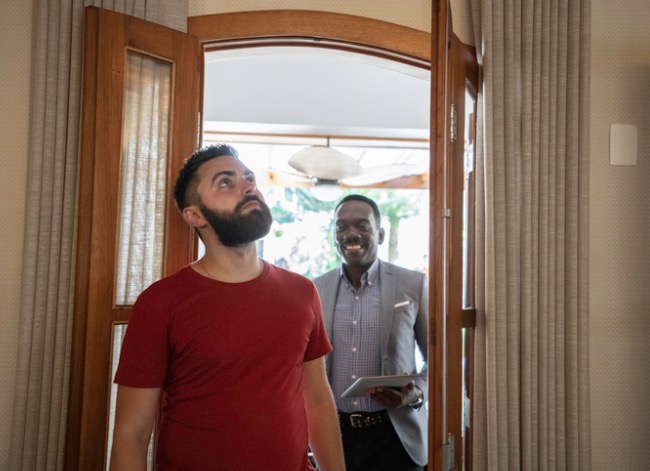We may earn revenue from the products available on this page and participate in affiliate programs. Learn More ›
In the past, open houses were seen as a crucial tool for buying or selling a home. But Covid-19 forced real estate agents, buyers, and sellers to create work-arounds. “Open houses have definitely taken a big hit since the pandemic started,” says Bill Golden, Realtor/associate broker at RE/MAX Around Atlanta in Georgia. For a while, he says, no one did them at all. “Now I see some people doing them while practicing proper safety precautions concerning Covid-19.”
But considering the risks, are open houses still worth it, especially given the many safer, more convenient tools available to today’s buyers and sellers?
Who goes to an open house, anyway?
According to Tyler Forte, CEO of Felix Homes in Franklin, Tennessee, the people who come to open houses tend to fall into two categories. “They are either nosy neighbors or they are potential home buyers who are extremely early in the buying process and are just trying to get a feel for the neighborhood,” he says. Before the pandemic, he notes, a good turnout at a popular open house might have been 10 to 15 people. “Now that social distancing and avoiding groups of people has become an everyday way of life, a good turnout may be three to five people.” If you’re the seller, that seems like a lot of trouble for a handful of potential buyers.

They’re good for Realtors, but are they good for you?
Well, if open houses don’t appear to be that effective, why are they so popular? “Open houses have always been a ‘dirty little secret’ in the real estate industry, primarily because they are an effective way to promote the listing agent,” Forte explains.
His view is shared by Golden, who says he’s never been a huge fan of open houses, even before the pandemic. “Generally, what I see are agents holding open houses so they can meet potential buyers and hopefully convert them to ongoing clients, looking at other properties.”
However, Cynthia Cummins, founder and Realtor at Kindred SF Homes in San Francisco, California, says an open house is the easiest way for buyers to glean an education about what the market has to offer. “If you have to do it one agent-accompanied, waiver-signed, 15-minute lockbox appointment at a time, it’s tedious and overly time-consuming.” And, she adds, things can get pretty heated among parties when two private showings overlap or if there’s confusion regarding who has which time slot.
Cummins also sees open houses as a way for consumers to shop for an agent to represent them. “I always say ‘first find your agent and then find your house.’ ” She believes that the lack of open houses is a disadvantage for buyers and sellers who don’t have the ability to casually meet real estate agents and decide which one feels right for them.

RELATED: How to Find a Real Estate Agent: 17 Tips for Success
Alternatives to open houses
Even if you’re a fan of open houses, this might not be the best time for them. “It does seem like an unnecessary risk right now, given the many other tools available to us to market homes,” Golden says. He explains that most buyers can get the majority of information they need using online sources, and the quality of pictures and virtual tours has greatly improved.
“Marketing a property via online sites and social media has become one of the most efficient and successful ways to get a home sold,” Golden says. And since most buyers are working with an agent, he notes that they can always ask for a private showing if they’re really interested in the home. “It’s extremely rare for a buyer to walk into an open house and end up buying that particular property.”
It may depend on the market.
In a slower market, an open house may still be essential. But in a seller’s market, it could be an unnecessary step. Simon Isaacs, owner/broker at Simon Isaacs Real Estate in Palm Beach, Florida, says his market is trading at such a rapid rate that open houses are not seen as a necessity right now.
“As soon as houses hit the market, owners are receiving multiple offers on the first day,” Isaacs reports. But he does think that in a slower market, and with clients who don’t know what they want and need to see a variety of options, an open house might be the right choice.
Golden agrees that the need for an open house depends on the market. “We are currently experiencing historically low levels of housing inventory, so most properties are sold immediately upon listing and are usually under contract by the time an open house would occur,” he explains.
While Cummins says her local association quickly adapted to San Francisco’s first shelter-in-place order and put Covid-safe protocols in place, she remains a fan of open houses. “I think I speak for nearly every agent working in San Francisco when I say we all miss open houses and can hardly wait for their return.”
RELATED: 12 Tips and Tricks We Learned from Professional Movers


